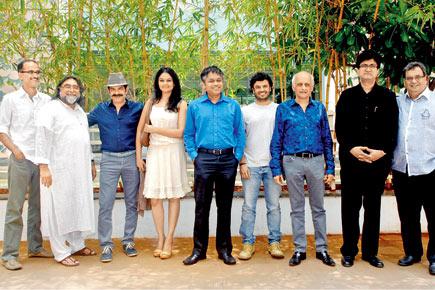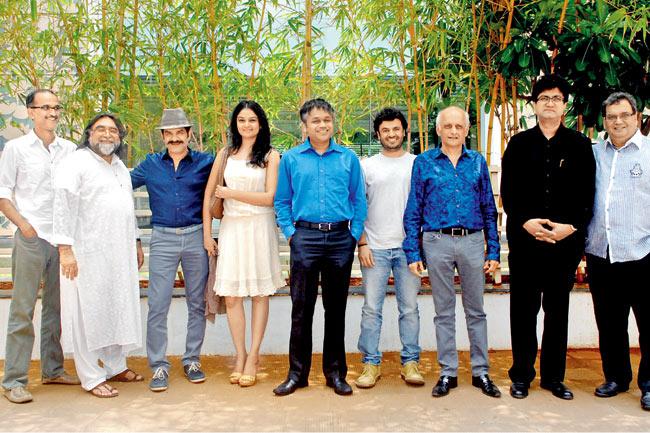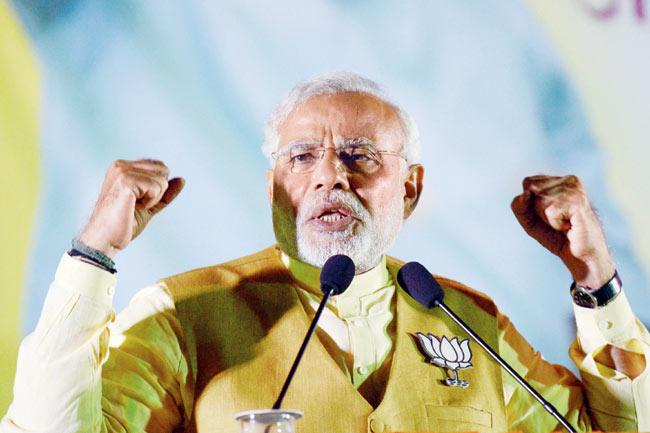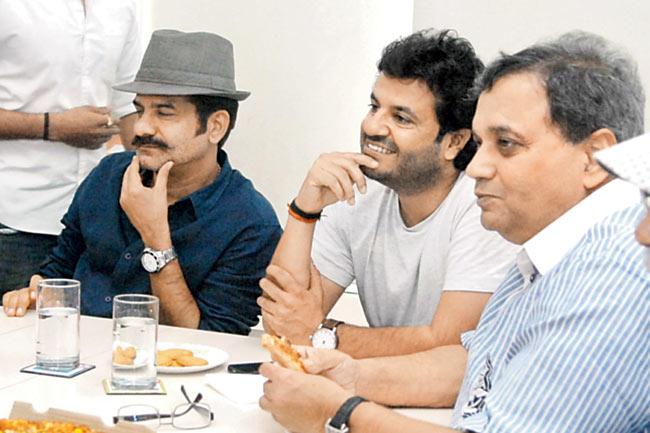Prominent Bollywood film directors, producers and actors got together at the mid day office to discuss what the Narendra Modi-led government might mean for the entertainment industry

Hitlist: What does the film industry, including you all, hope from the new, Modi government?
Prasoon Joshi: Changes in the business side are important. The government could start by reducing entertainment tax. I don’t think we were particularly free and liberal in the past, so I don’t see drastic changes happening there. Hopefully, this will be a decisive government.
Also read: Censor Board axes Alia-Varun kiss from Karan Johar's next
 From left: Rohan Sippy, Prahlad Kakar, JD Majethia, Tejiswini Kolhapure, Ajit Andhare, Vikas Bahl, Mukesh Bhatt, Prasoon Joshi and Subhash Ghai. Pics/Shadab Khan
From left: Rohan Sippy, Prahlad Kakar, JD Majethia, Tejiswini Kolhapure, Ajit Andhare, Vikas Bahl, Mukesh Bhatt, Prasoon Joshi and Subhash Ghai. Pics/Shadab Khan
Ajit Andhare: The film industry must be treated as an industry first.
Rohan Sippy: Interestingly, Sushma Swaraj was the one who first accorded the industry status to Bollywood back in 1998. Now that they’re back, they will hopefully implement it.
Ajit Andhare: Absolutely. After being recognised as an industry, it should be treated as one, too. How will you encourage the industry? Look at your tax regime. Is it uniform? Let’s take the issue of entertainment tax, which is 35 per cent or higher. Earlier, theatres under-reported their revenues because the system was fragmented and disorganised. The entertainment tax helped them maximise returns. Now, we must either eliminate the tax or bring it down to be in line with other industries. You cannot have VAT, service tax and a high entertainment tax. And if the tax is high, what is the government’s investment back into the industry to improve the economics?
However, I would not like to see the same level of involvement by the government when it comes to content. Content is about liberty and freedom of expression. Within that, the only area I would want the government to intervene on is when it concerns the Censor Board. If, say the Board censors a movie, the government of the day should do everything to ensure its screening. If the government does not have the power to help a certified movie screen in cinemas, I’d say the law-and-order situation is fractured.
Also read: Bollywood films that faced opposition other than Censor Board
Prahlad Kakar: The government never takes the movie industry seriously because of the way the Censor Board is structured. You have an eminent person as the head, and the rest are ministers’ wives, MPs’ cousins and so on. Why are they there? Because they want to watch free movies. Some of them are illiterate. The Censor Board should sack the current members and get sociologists, historians and academicians on board.

Will the Narendra Modi government stifle creative freedom in the name of preserving Indian culture? Filmmakers and actors prefer to wait and watch
Prasoon Joshi: But how will that be done? People who believe in freedom of expression, don’t want to be on the Censor Board.
Prahlad Kakar: Because they think it’s not right to censor creative expression. But, again, not all these filmmakers
are liberal.
Prasoon Joshi: Should the government have any right to censor at all? Other countries don’t have it — why do we need it in India? Should there be a government board, or another regulating body?
Rohan Sippy: Television, for instance, is not censored.
JD Majethia: I think policies will be progressive now. Modi did not ban a Gujarati play called Aa NaMo Saho Nade Che (NaMo Fights With Everyone).
Hitlist: But in a democratic country, that is basic freedom, is it not?
Rohan Sippy: Ideally, yes.
Mukesh Bhatt: What JD said is heartening, because I have not had a good experience with the BJP. My film Zakhm (1998) was banned. It revolved around the 1993 riots in Mumbai. Everybody knows the saffron brigade was a problem and we were told to change the colour of a band used in the film — from saffron to maroon. My brother (Mahesh Bhatt) did not compromise because the film was close to his heart. Back then, Ashaji (Parekh) was the chairman of the Censor Board. The film went on to get a National Award for its theme of national integrity. The old guard was different. Now, the fear is of the government becoming a cultural dictator. In his inaugural speech, Modi spoke about progress and development. Progress, also means not clipping wings of creativity; expression must not be choked and suffocated. Give us the freedom of speech. That’s a fundamental right in democracy. We should see to it that there is no cultural control on cinema.
Hitlist: How do we do that?
Mukesh Bhatt: You should be given the creative freedom to make whatever film you want.
Prahlad Kakar: That is a utopian idea.
Mukesh Bhatt: It is okay as long as it’s not something that is going to affect the national integrity of the country, and nothing that hurts the religious sentiments of any community. We are sensible people, but there will be people who misuse the freedom. In the last five years, the Censor Board has come a long way. True, the board should not consist of friends of ministers and their wives. But I do feel that things have improved.

Hitlist: Are things really as good as you say they are? The last few years have seen many bans in spite of the getting a clearance from the Censor Board.
Mukesh Bhatt: Hopefully, the Cinematographer’s Act will be implemented soon. Javed Akhtar and I have had a great debate on that. We have raised these bans as a critical issue. I know what problems we faced during Aarakshan and Vishwaroopam.
Ajit Andhare: We couldn’t release Madras Café, which was certified by the board. To me that’s a failing of the law. If we have a Censor Board, like Prahlad says, it must be well-constituted. If a Censor Board had issued a certificate, does the government have the right to ban a film?
Mukesh Bhatt: Prakash’s film was cleared in Maharashtra, as I had spoken to Chhagan Bhujpal and even Prithviraj Chavan. Everything seemed okay. But suddenly in Latur and Aurangabad, a local cop instructed not to screen
the movie.
Ajit Andhare: This is what we are talking about. Why do you have to speak to a Bhujpal if the film has been certified by the Censor Board?
Mukesh Bhatt: This is because the judiciary is also confused. Sometimes they say it is a problem of the Centre, other times they point to the State. When the judiciary comes in, the government becomes handicapped. The judiciary should be introspected.
Ajit Andhare: Which was the last film the judiciary blocked? The problem is with vested political interests in the state government that bans the film.
Mukesh Bhatt: We have mentioned in the new Cinematographers Act that if anyone has a problem with a film, they should appeal to the tribunal. It’s the tribunal’s duty to find a solution. There should be a tribunal in every state, not just in Delhi, and it should hold the final authority.
Prasoon Joshi: There has to be a political will that if someone tries to sabotage a film, he shouldn’t be allowed to do so. I suggest that representatives of the film industry should voice our concerns and have an open dialogue with the government.
JD Majethia: We have a fantastic representation in the Parliament from the industry this time. We should address these issues before they impose new rules
on us.
Prasoon Joshi: There are two aspects to be considered here — the business part and the artistic expression. While it is easy to address business issues, it is the artistic expression that will face difficulties, which cannot be handled by one certification. If you have a creative voice, a counter-voice is equally important.
Rohan Sippy: The media should frame these things correctly at the time of release. Rather than looking for sensational headlines, they should be framed as criminal acts. The media also puts pressure. They justify the stand of the illegal protestors, which motivates them.
JD Majethia: Today, even producers have thought of taking the advantage of a controversy. When a film is about to release, they feel that a sensational news will give it mileage. The need of the hour is to have our industry representatives in the house.
Vikas Bahl: I don’t think those elected from the film fraternity are going to stand up for the entertainment industry. They have their own vested interests.
JD Majethia: I have known Paresh Rawal as a theatre person. If you put your case correctly in front of him, he will fight for us.
Mukesh Bhatt: Shatrughan Sinha is a vocal man, too.
Vikas Bahl: Do you believe that things are actually changing?
Prasoon Joshi: This is a huge victory. Would that reflect that the change of discourse would automatically reflect the way you create entertainment, the way you make art? Would it reflect in the way you do business?
Vikas Bahl: The important thing is the basis on which they have won. For the first time, elections have been won on governance and not on caste and religious sentiments. If you change the approach of running the country, everything will change.
Prahlad Kakar: There is a fundamental issue that needs to be addressed. The kind of people who have voted for Modi are essentially Hindi and vernacular. Therefore they are far more conservative than the pseudo-intellectual elite.
Prasoon Joshi: That’s being judgmental.
Vikas Bahl: Riding the elections is one thing, running the country is another. For the first time, the reason why you fight elections and the reason why you will continue to succeed is the same. And that changed a lot because of Arvind Kejriwal.
Prahlad Kakar: Let’s look at all the BJP-ruled states. You think Karnataka didn’t have a spate of moral policing? There has to be a political will at the Centre to say this won’t be tolerated. RSS won because of BJP’s scaly structure, but we are all hoping that that’s not the case. The RSS is going to get stronger. We all hope that Modi understands that the youth and the population is going to scrutinise every move of the
new government.
Ajit Andhare: I think the central question is: will this right-wing extremism lunatic fringe get the kind of importance that it can control the cultural discourse? Will it trickle down to the kind of content that is getting shaped in the country? Personally, I would not worry about this for the following reasons. I look at the state of Gujarat. I see no khaps nor moral policing there. I see a four-year-old steady government. It gives me confidence that Togadia has been externed from Gujarat. There is grand symbolism in Narendra Modi’s speeches post the elections. But the ritual of the Ganga aarti was just that, a Hindutva symbol.
Hitlist: Hope it stays that way.
Ajit Andhare: Like Vikas pointed out, his central idea has always been of development. So as long as there is a balanced approach, I don’t think we need to worry so much about the right wing.
Prasoon Joshi: When people say ‘Narendra Modi jitna jeeta hai utna nahi jeet sakte hai’, there is sense of denial. And, I don’t want that sense of denial in the industry.
In the last three months when my agency handled the campaign, people thought the campaign led to the victory. But no, the campaign didn’t do the work — it only said, ‘Abki baar Modi sarkar’. The mood of the nation got reflected in the electorate’s decision.
But, how should we keep practicing as free artistes? I suggest an open forum for those who are going to govern us and the creative industry. It is important that the industry’s fears and views are heard and tabled at the forum.
Ajit Andhare: What worries us are statements by people like Mithilesh Tripathi — he said they will look into whether the creative media is in line with Indian culture — that statement is scary.
Vikas Bahl: Our biggest problem right now is that we have a really warped sense of fear and fearlessness. At one level, we are scared of so many things because there is no one protecting us. There are so many things beyond the control of law and order. If I, for instance, take a film to the Censor Board, they may disapprove a film out of the fear that someone is going to protest somewhere. At the same time, there is always someone who’s going to stand up and be fearless about what he’s going to do about his reaction to the film. This imbalance is largely because there is no clarity. Who protects whom? Who can stand up for anything? What is the government to do? What is
their stand?
Prasoon Joshi: I think it is wrong to say they will give clarity.
Vikas Bahl: Prasoon, most of our solutions are so superficial. If we are looking at the recent elections as a revolution, I think everything has to thought of in terms of ‘10 years from now’. These elections are not important. The elections five years from now are important.
Mukesh Bhatt: What will you do if the state is against your film, but the Centre has supported and even given it a certificate? Prakash Jha’s film Aarakshan was banned by Mayawati. I spoke to Manish Tewari and he said the film should be released. We approached the Supreme Court and the film was released two or three weeks later. But, by then, the damage was done. The state manipulates and is the opposition. If the state government is not the same as the one at the centre, then for the sake of political vendetta, they will do something. Movie bans have nothing to do with you or me.
Vikas Bahl: About 70 per cent of state governments is the same as the one ruling at the centre. There was always confusion about whether we should vote for the centre or the local guy. So what if in the next couple of years, we start voting for the centre, for the first time? That will be a huge change in the way people vote.
Prasoon Joshi: This is impractical. India is a diverse nation. You can’t say there is a uniform code of culture running through the country.
Vikas Bahl: It’s about governance. If something has to be implemented, can it be implemented in the country
or not?
JD Majethia: We are talking about state law and order. A film like Ram Leela, in the best of governance, got 26 out of 26 but they could not do anything because one religious community got offended. What is the government going to do about that?
Vikas Bahl: But there is a difference between cultural difference of opinion and the vested interest. We are unable to differentiate between the two.
Prasoon Joshi: Vested interest should be kept aside. The government shouldn’t interfere with that. For instance, if a theatre owner of a certain community decides to not run a film in his theatre, explaining that its his theatre and that the film is not in tune with his sensibilities, then it’s his choice.
Vikas Bahl: We are unable to figure out the difference between vested interest and a genuine cultural difference of opinion. In Queen, because I showed the prostitute as a Muslim girl, the Censor Board asked me if I want to go ahead with the film because there might be a dharna outside my house. And I said, go with it. It didn’t become an issue. The Censor Board was supportive.
Prasoon Joshi: After Bhaag Milkha Bhaag, I was told that the end of the film is manipulated and that I have shown that he’s won in Pakistan. I was asked, “Uski life mein Olympics important hona chahiye. Jab ki aapne Pakistan ko important dikhaaya. Are you being artistically manipulative?” How do you answer such questions? What do you do if someone blames you for exploiting a cultural difference?
Ajit Andhare: The question is, who draws the line?
Vikas Bahl: Meddling is the problem. I remember in Kaminey, something was written on the door — Baba Bhole Nath — and those people stood up. You really don’t know if they genuinely mean it or whether it’s for mileage.
Ajit Andhare: All we want is the government to provide us with law and order so that those with vested interests will not be able to disrupt films.
Prasoon Joshi: That’s why I am saying, we should go the new government with our issues.
Subhash Ghai: I would like to know one thing. What is your fear?
Prahlad Kakar: Our fear is the fringe folks like the Bajrang Dal.
Mukesh Bhatt: We should be on our guard. We shouldn’t like be Alice in Wonderland. Jab aayega tab dekhenge.
Tejaswini Kolhapure: It is too early to preempt anything — all eyes are on Modi. The BJP manifesto is pretty impressive. I hope freedom of speech, expression and creativity isn’t hampered. I don’t want old wine in a new bottle.
Subhash Ghai: The censorship issue has remains unresolved since the past 40 years, and I don’t see things improving in the next 40 years, either. Cinema is a democratic art — you will have both good and bad filmmakers. The difference in the sensibilities of the Censor Board and filmmakers will not disappear anytime soon. The Board wants us to censor ourselves, and we don’t want to do that either, because individual expression is subjective. How does one censor one’s own project, then?
Prasoon Joshi: Let them know that we’re not a bunch of irresponsible people. Interacting with them will make them realise that they can trust us.
Subhash Ghai: Based on my personal talk with a few BJP leaders, I feel this time they are receptive because they are coming after 10 years. They really have to look into this with a fresh mandate. They will definitely approach the industry with a more open mind.
JD Majethia: Their mindset is progressive.
Vikas Bahl: I remember the way Kai Po Che happened, and the way the government supported it. I remember Gattu going there and meeting the government. And they did not ask him, “What is your script? How are you going to promote Gujarat?”
Rohan Sippy: Rang De Basanti got wiped out because of that. They were banned by BJP. There was another film that the Gujarati exhibitors banned — Fanaa.
JD Majethia: That was because of Aamir’s Narmada statement.
Hitlist: It’s good to be hopeful but the fact remains that the government’s entertainment cell will look into the cultural content in films.
Mukesh Bhatt: That is not acceptable.
JD Majethia: How you percieve it is also important. Modi connects with the youth and as the convenor of the BJP’s Cultural Cell, he is only trying to make his job description better.
Prasoon Joshi: I think Modi is open to suggestions provided they are given immediately.
Vikas Bahl: If someone claims that his/her film promotes Indian culture and pays 40 per cent subsidy, what’s wrong with that? It happens everywhere.
Prasoon Joshi: But the definition of culture is subjective. When you make a film on a dog fight, will you consider it to be a film showcasing the culture of Latin America? Culture isn’t religion.
Ajit Andhare: If you can actually promote cultural discourse on a global level, it will help fix industry issues.
Prasoon Joshi: It’s more complicated than that.
Ajit Andhare: I am sure it’s complex. But I hope this government ponders over what we are saying.
Mukesh Bhatt: China collects five per cent entertainment tax and the government doesn’t use it for any other purpose. Instead, it invests that money to open more theatres. China has got more than 50,000 theatres. We’ve got 12,500 theatres, out of which 6,000 screen regional cinema. Our fate is decided on weekends by 5,500 theatres.
JD Majethia: Today, TV has become a medium of spreading awareness. All TV shows begin with outdoor shoots but eventually go back to the studios, which reduces the entertainment quotient. Training institutes in major cities lack infrastructure. This country is full of talent but only the few who have access to this city get a platform. There are tax-free benefits for films based on social issues. If similar policies are introduced to revive Doordarshan, or incentives are given to satellite channels, we will have more shows like Satyamev Jayate.
Hitlist: To sum it up, are we more optimistic than fearful of the new regime?
Everyone: Yes!
Moderated by Shubha Shetty-Saha
Transcribed by Shreya Agarwal
 Subscribe today by clicking the link and stay updated with the latest news!" Click here!
Subscribe today by clicking the link and stay updated with the latest news!" Click here!









